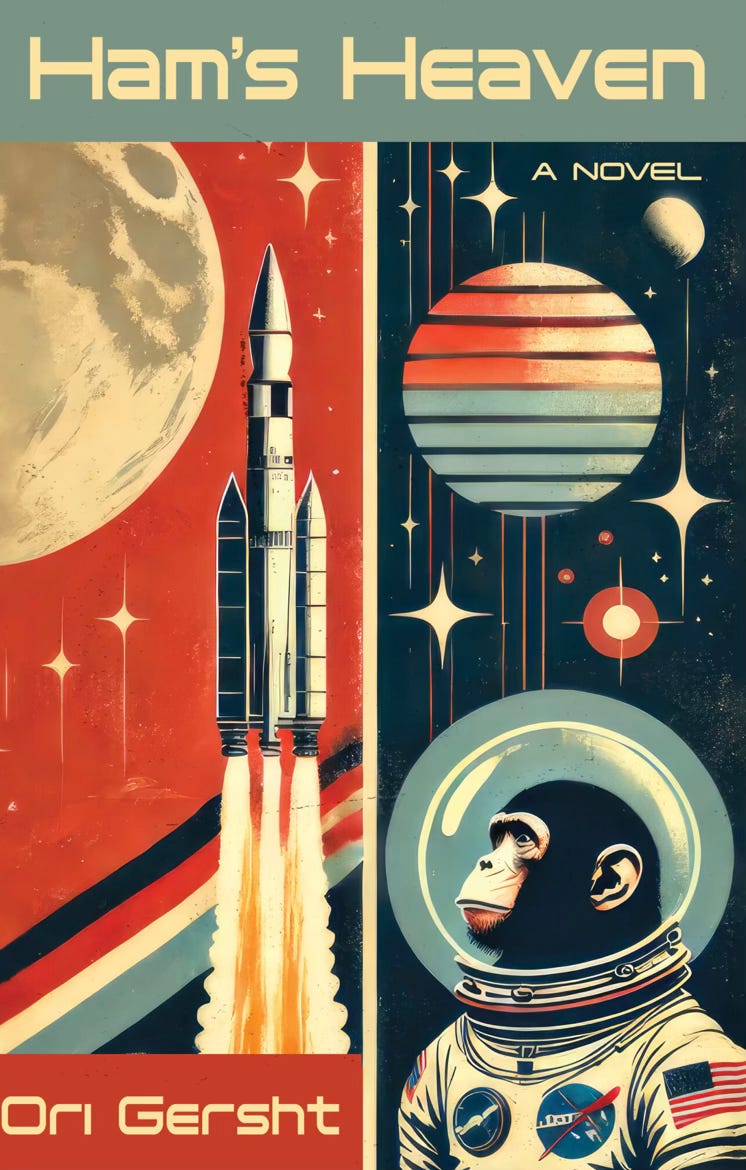Ham’s Heaven by Ori Gersht
Poignant novel about the chimp who set the course for human U.S. space travel—but, unlike Shepard, Armstrong, et al., was mostly unappreciated
Early in her career, Jane Goodall (1934-2025) attended a conference about chimpanzees. It was a life changer for the English primatologist: “I went to that conference as a scientist. I left four days later as an activist.” Goodall began a long, determined effort to free chimps from the horrors inflicted on them by medical research.
Her work paid off. “I don’t think there are any chimps in medical research anywhere anymore,” Goodall was eventually able to report.
Indeed, all had not been good for chimps previously. Not that you’d know from the cheery February 10, 1961 cover photo of Life magazine: a chimp looking adorable and cozy inside a Mercury Redstone 2 rocket. The chimp, Ham, had just returned from a suborbital flight—a much-vaunted triumph for the United States in its efforts to catch up with the Soviets, post-Sputnik.
As revealed in Ori Gersht’s poignant novel Ham’s Heaven, the chimp’s heavenly excursion was anything but. Training for the flight, the French-Cameroon-born Ham endured electric shocks when he didn’t handle the levers right. To monitor Ham’s vital signs during the 16-minute, 157-mile-altitude voyage, scientists not only stuck physiological sensors on him, but jammed an eight-inch probe up his rectum.
During the flight, the emergency-escape rocket broke off, subjecting Ham to a descent back to earth at excessive speed. Part of the module broke loose, deeply gashing his face.
In his novel, Gersht relates Ham’s life from the point of view of a chimp trainer, Bradley Rose. In Gersht’s brilliant story arc, Bradley transforms, via his love for Ham, from insecure, scared geek to brave, bold chimp liberator.
Granted, as a David vs. the Goliath of the medical establishment, he’s only briefly successful as a liberator. No spoilers here, as most pro-animal activism of the time similarly failed. But, as the late Robert F. Kennedy noted, every ripple of effort builds with others to sweep down oppression. The same year as Ham’s flight, the World Wildlife Fund started. In 1977 Goodall, later awarded an OBE by Queen Elizabeth, founded the Jane Goodall Institute to protect chimps and chimp habitats.
Published by Warbler Press shortly before Goodall’s death, Ham’s Heaven is a timely, and timeless, tribute to her and all animal rights activists. The more you read of the novel, the more grateful you feel to them. For example, pre-space flight, Ham’s name was 65. Scientists cynically decided that, if the rocket crashed, it’d be better to identify the dead chimp by a number. A name would be too personalizing, more likely to result in negative publicity.
Gersht has Bradley and 65 meet at the Holloman Aerospace Medical Center in New Mexico. The author imagines gradual trust growing between them. Bradley kept extending a hand to the wary chimp. One day, breakthrough: 65 didn’t retreat. He “took a step forward, lifted his arm, and gently touched Bradley’s hand with one finger.” After a while 65 would sit on Bradley’s lap, stroking his face and hair. “They spent nearly every day together.”
The bromance couldn’t last. After his flight, the newly named Ham (Holloman Aerospace Medical) lived, if you can call it living, in a cage. Then space bureaucrats transported him to zoos, first in Washington, D.C., then North Carolina. He died at the latter in 1983, aged 25. Ham’s skeleton is preserved at the National Museum of Health and Medicine (aptly, another HAM acronym).
Ham’s flight helped prepare Alan Shepard to be the first human American in space, in May 1961. Shepard enjoyed a stellar career: more space travel, awards, wealth, fame, adulation.
Ham’s reward on his return from space? An apple. Which he was quite happy with.
About the Author
An internationally acclaimed artist, Ori Gersht is a graduate of the Royal College of Art, London, Gersht has served as Professor of Photography at the University for the Creative Arts in Rochester, England. His work is in major collections, including: the Guggenheim, New York City; the J. Paul Getty Museum, Los Angeles; the Victoria & Albert Museum and the Tate, London.
About the Translator
Joanna Chen is a British-born writer and translator of contemporary Hebrew literature. Other of her translations include Yonatan Berg’s Frayed Light (finalist for the National Jewish Book Awards) and Meir Shalev’s My Wild Garden.
About the Reviewer
Melanie Jackson is a Vancouver freelance writer/editor. She’s also the award-winning author of middle-grade/YA suspensers, including Orca Books’ Dinah Galloway Mystery Series, and several chillers set in amusement parks. Visit Melanie’s page at The Writers’ Union of Canada site.
Book Details
Publisher: Warbler Press, September 3, 2025
Language: English
Paperback and ebook: 150 pages
ISBN 978-1-965684-52-8 (paperback)
ISBN 978-1-965684-53-5 (ebook)



